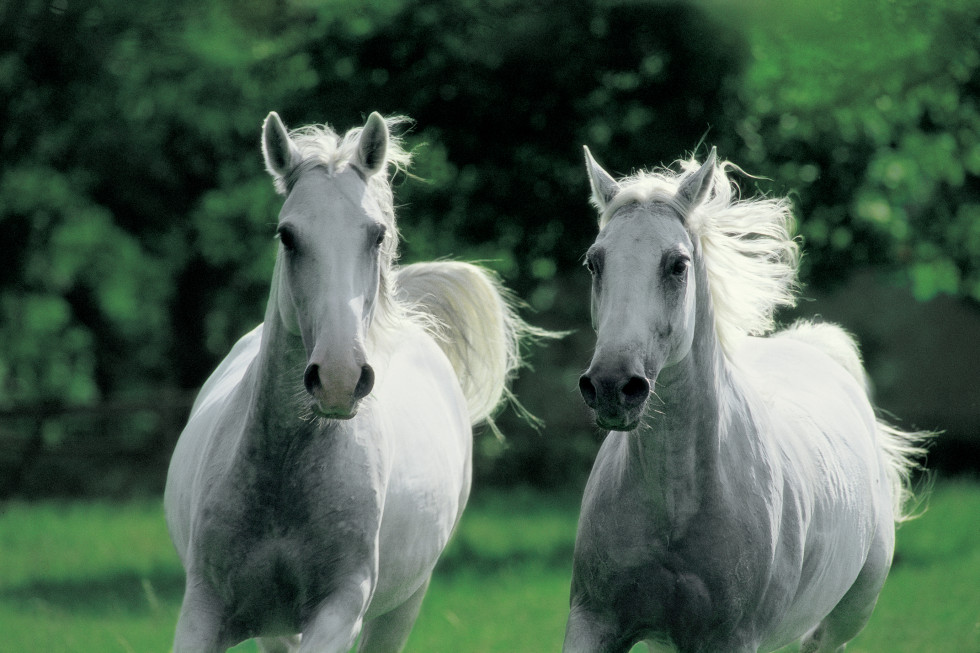Lipizzan horse breeding traditions inscribed on the UNESCO Representative List of Intangible Cultural Heritage of Humanity
- Ministry of Culture
- Ministry of Economic Development and Technology

Lipizzan horses | Author Ministrstvo za kmetijstvo, gozdarstvo in prehrano
The international preparation of the nomination of Lipizzan horse breeding traditions to be entered in the UNESCO Representative List of Intangible Cultural Heritage was led by the Ministry of Culture of the Republic of Slovenia in cooperation with the representatives of the Lipica Stud Farm and the Slovenian Ethnographic Museum. The demanding multiannual work was managed at the Ministry of Culture by Špela Spanžel, Acting Director-General of the Cultural Heritage Directorate. The multinational project represents a joint European heritage and sets it in a broader cultural context. It combines eight States Parties to the Convention for the Safeguarding of the Intangible Cultural Heritage, i.e. Austria, Bosnia and Herzegovina, Croatia, Italy, Hungary, Romania, Slovakia and Slovenia. Under Slovenian leadership, the countries have been brought together to present the cultural diversity and practices of social phenomena linked with the breeding of this renowned breed of horses.
Upon the confirmation of the nomination, Spanžel said, "Lipizzan horses have played a symbolic role in all eight countries for centuries. They still represent numerous communities, which testifies to the close emotional bond between people and horses and the harmonious lives of our ancestors with nature and their environment, from which modern societies are becoming detached. With the entry, we confirm the strong cultural dimension that is, among other things, reflected in the rich cultural heritage and social significance still attributed to the breeding of Lipizzan horses today. Close cooperation between the countries will continue after the inscription. We have committed to introduce joint measures for the protection of this intangible heritage, which we have pledged to do with this nomination."
The drafting of the nomination combined the representatives of state stud farms and private breeders, experts on intangible heritage, researchers and local communities. The project started at the initiative of state stud farms that focus on the breeding and rearing of Lipizzan horses. Since 2018, the project has been in the exclusive domain of culture and was managed under the auspices of the ministries of culture of the participating countries in accordance with UNESCO rules.
The inscription proves the existence and importance of intangible heritage as an aggregate of knowledge, practices and skills linked to the breeding and rearing of Lipizzan horses. The tradition is historically founded within the framework of the former Habsburg monarchy and the Austro-Hungarian Empire. It involves a centuries old development of social practices and cultural expressions, which remain a part of rituals, celebrations and modern equestrian sports even today. The primary purpose of breeding horses, which is based on carefully documented experience and knowledge of the evolution of the breed, is connected with classical dressage and equestrian sports, with which all participating countries identify. In some countries, it was also part of the everyday village community life where the Lipizzan horse was used as a workhorse. Horses take part in numerous events, celebrations and festivities and have a strong symbolic value. They have an increasing role in sustainable tourism and equine-assisted therapy. An important aspect of all the aforementioned activities is the special relationship between people and horses, which is based on trust and where the horse is recognised as an equal partner or even a family member.
On the UNESCO website, under point 7.b.40, more information on the nomination of the Lipizzaner Breeding Tradition is published.
So far, Slovenia has inscribed four units on the Representative List of Intangible Cultural Heritage: the Škofja Loka Passion Play, the Door-to-door rounds of Kurenti, the Bobbin lacemaking in Slovenia, and the Art of dry stone walling, knowledge and techniques, which was included in a multinational inscription. As part of the multinational nomination led by Germany, midwifery is in the process of inscription (the decision is anticipated in 2023). Slovenia also participates in the extension of the inscription of dry stone walling to three new countries.

